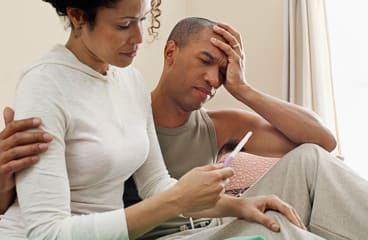Overview

Infertility means that you haven't been able to get pregnant after trying for at least 1 year (or 6 months if you're over 35). It doesn't mean you'll never get pregnant.
Your chances of getting pregnant are higher when you are younger. You are most able to get pregnant (fertile) in your late 20s. Then, in your mid-30s, you become less fertile. This is because your eggs get older.
Trouble getting pregnant can be caused by a problem with the reproductive system. Talk with your doctor about testing and treatment. Testing will likely start with hormone and semen testing.
There is a wide range of treatment options. They include medicines, surgery, insemination, and in vitro fertilization (IVF).
Follow-up care is a key part of your treatment and safety. Be sure to make and go to all appointments, and contact your doctor if you are having problems. It's also a good idea to know your test results and keep a list of the medicines you take.
How can you care for yourself at home?
- Take a multivitamin with folic acid. This helps to prevent birth defects if you do become pregnant.
- Get regular exercise. But do not overdo it. Excessive exercise can cause eggs to release less often or sperm count to lower.
- Avoid too much caffeine use.
- Avoid alcohol, marijuana, and other drugs. If you need help decreasing your use, talk to your doctor.
- Don’t smoke, vape, or use nicotine or tobacco. If you need help quitting, talk to your doctor about quit programs and medicines.
- Stay at a weight that is healthy for you. Being overweight or weighing too little can affect fertility.
- Limit exposure to endocrine-disrupting chemicals (EDCs). These are substances that can affect your body's hormones. They can be found in some plastics, food packaging, pesticides, and personal care and household products.
- Try to limit fast food and highly processed foods. Try to choose organic, fresh, or frozen produce when possible. Wash fresh fruits and vegetables well to reduce pesticides.
- Store and prepare food and drinks in glass or non-plastic containers when possible.
- Try to choose personal care and household products that are unscented and that don't have phthalates and parabens.
- Use chemical-free cleaners when possible. If you must use chemical cleaners, wear gloves, ventilate the area, and avoid breathing in fumes.
- Talk to your doctor about all medicines you are taking or may take. This includes over-the-counter and prescribed medicines and herbal remedies. Some medicines interfere with pregnancy.
- Write down when your period starts and stops for a few months. Bring that information to your doctor. Your doctor can help you figure out when you ovulate and are most likely to get pregnant if you have sex. Or you may prefer to use a home ovulation test.
- If you know when you will ovulate, try to have sex once a day for the 4 days before ovulation and on the day of ovulation.
- If you don't know when you will ovulate, have sex 2 or 3 times each week.
- Don't use lubricants during sex. They may affect how well sperm can travel to meet an egg.
When should you call for help?
Watch closely for changes in your health, and be sure to contact your doctor if you have any problems.
Where can you learn more?
Go to http://www.healthwise.net/patientEd
Enter C591 in the search box to learn more about "Infertility: Care Instructions".
Current as of: May 5, 2025
Author: Ignite Healthwise, LLC Staff
Clinical Review Board
All Ignite Healthwise, LLC education is reviewed by a team that includes physicians, nurses, advanced practitioners, registered dieticians, and other healthcare professionals.

